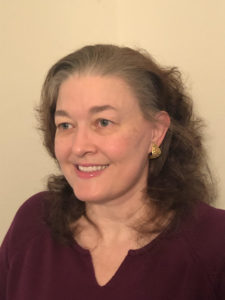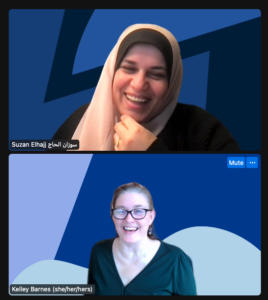
Mentorship has a positive cascading effect. When you mentor someone, you not only empower them, but give that person the skills and knowledge they need to mentor others.
This is certainly true for Kelley Barnes, an HR manager at Indeed, who pivoted her career over 12 years ago. During this career leap, she met her mentor, Cathy Montes, who “gave me a solid foundation in talent acquisition as I was transferring from Marketing into Human Resources,” states Barnes. “If not for Montes’ guidance and mentorship, I would not have stayed in Human Resources as a new career field or be in my current position.” Mentorship was key in Barnes’ professional journey. And today, she pays this forward by being a mentor herself.
“Kelley helps me with the challenges I face and provides great tips, advice, and new ways to think about hurdles,” says Barnes’ mentee, Suzan Elhajj, an Implementation Project Manager for Technical Services. “I have guidance and someone who actively listens to the issues I’m facing, and I feel very fortunate to be able to benefit from Kelley’s experience and apply it to my career,” Elhajj continues. “Being a mentee has been great for me, especially with a person as great as Kelley.”
At Indeed, Barnes, Elhajj, and many others are empowered to utilize mentorship to the fullest via a dedicated program: Mentor Connect. This program “embraces the philosophy of ‘everyone has something to teach’ by empowering employees from all different departments and stages in their career growth to participate,” explains Barnes. In the program, a mentee looking to learn more about a particular technical, professional, or interpersonal skill is paired with a mentor who has that expertise for a three-month period.
“This program has been so successful that in both cohorts where I have been involved, there are more mentee sign-ups than there are available mentors,” Barnes tells us. “Often, the mentor volunteers will agree to pair up with two or more individuals so as many people as possible get to benefit from the experience.”
As a mentee in the program, Elhajj notes how “Mentor Connect made it easier to choose the areas that I wanted to focus on.” And, Elhajj shares that while she was paired with Barnes in the formal program, their relationship has continued naturally to the second cohort, too.
Want to learn more about how to make a mentorship relationship work (both as a mentor and a mentee)? What about how Indeed helps all people grow and rise? Read on to learn more from Barnes and Elhajj!
What advice would you give someone hoping to make the best of a mentor/mentee relationship?

Barnes: The most effective, productive mentoring relationships I have observed are ones where the mentee is proactive and takes the initiative to propose topics and verbalize their needs. If the mentor isn’t meeting those needs with their advice, then the return on investment in the relationship will be of limited value.
Also, don’t be constrained to a set schedule; some of the best conversations I have had as a mentee have been contemporaneous with a complex issue that I was confronting at the time. Just-in-time mentoring can be the most impactful result of a pairing.
If you work in the same organization as your mentor, don’t miss the opportunity to ask about cultural norms, learn about the unwritten rules of the company, and ask about other opportunities or activities you can get involved in. And, if you are filling the mentor role in the partnership, remember your role is not to solve the mentees problems for them — instead, help them discover the tools that they need and problem-solve for the solutions they want to apply.
Elhajj: Stay curious and make the best out of your mentor’s time. They may know of resources that you have not seen before or did not know existed. Reach out to them if you are stuck with something. The thing I love most about my mentorship relationship with Kelley is that she challenges me to think differently and explore other ways to navigate experiences.
What are the top traits that you think a good mentor should have?
- Good active listening skills (Barnes and Elhajj)
- High emotional intelligence (Barnes)
- Providing a new perspective to help mentees think about navigating career challenges and what to do next (Elhajj)
- The ability to ask probing questions that make you think (Barnes)
- The ability to build trust and confidence in mentees (Elhajj)
- Possesses skills/knowledge in the area(s) you want to develop (Barnes)
- Has access to resources to challenge and upskill mentees (Elhajj)
- A willingness to share and make connections in their network (Barnes)
On the other hand, what traits and skills should a mentee have to make the most of their mentorship experience?
- A interest and orientation toward learning (Barnes and Elhajj)
- A willingness to step out of your comfort zone (Barnes)
- The ability to take advice and apply the tips you learned from your mentor (Elhajj)
- Curiosity (Barnes)
- Being prepared to ask questions and complete homework (Elhajj)
- Transparency regarding their goals for the partnership (Barnes)
- Respect for the time their mentor has offered (Elhajj)
Do you feel like your mentorship experience has been reflective of the overall culture at Indeed?
Barnes: Yes, my experience of connecting and sharing with my mentees aligns with the Indeed core value of Inclusion & Belonging, which is one of five principles that drive all of our decisions. Participating in Mentor Connect is not just a mentee and mentor meeting — the employee development team supports the participants with a slew of resources around how to create a psychologically safe space for the partnership to thrive.
Elhajj: Indeed has great employees with great experiences. I don’t recall a time when I asked for help from someone and got turned down. If someone is unable to help, they just reroute me to someone who can!
Is there anything else we didn’t ask about that you’d like to mention?

Barnes: “Making the Most of Being Mentored” and “Mentoring” by Gordon Shea are two
books that provide a great common sense resource with good checklists and suggestions for conversation topics and how to systematically maximize the value of your time in a mentoring relationship.
I particularly like his observations on approaching change as a natural outcome from mentoring. As he says, “there may be fear of the unknown or possible failure. The best prescription for dealing with these issues is frequent, candid, constructive, caring dialogue.”
Elhajj: To find a mentor or mentee when there isn’t an existing system in place, you can use your network and connections within or outside of your company and ask your manager for advice on how to do it. Inclusion Resource Groups (IRGs) are also a great place to find mentors. Many IRGs create these mentorship programs to overcome challenges that underrepresented groups may face while navigating their careers.
If your company does not have a mentor program and you have the ability to take this on: create one yourself or partner with relevant teams to build a mentorship program. Be the change you want to see!
Original article featured on FairyGodBoss.



